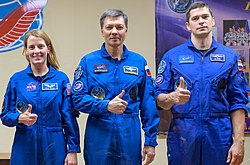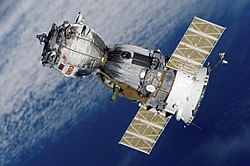 Soyuz MS-24 approaching the ISS | |
| Names | ISS 70S |
|---|---|
| Mission type | ISS crew transport |
| Operator | Roscosmos |
| COSPAR ID | 2023-143A |
| SATCAT no. | 57862 |
| Mission duration | 203 days, 15 hours, 33 minutes and 12 seconds |
| Spacecraft properties | |
| Spacecraft | Soyuz MS-25 No. 755 |
| Spacecraft type | Soyuz MS |
| Manufacturer | Energia |
| Crew | |
| Crew size | 3 |
| Members | Loral O'Hara |
| Launching | |
| Landing | |
| Callsign | Antares |
| Start of mission | |
| Launch date | 15 September 2023, 15:44:35 UTC |
| Rocket | Soyuz-2.1a |
| Launch site | Baikonur, Site 31/6 |
| Contractor | RKTs Progress |
| End of mission | |
| Landing date | 6 April 2024, 07:17:47 UTC |
| Landing site | Kazakh Steppe, Kazakhstan ( 47°25′6.12″N69°38′56.22″E / 47.4183667°N 69.6489500°E ) |
| Orbital parameters | |
| Reference system | Geocentric orbit |
| Regime | Low Earth orbit |
| Inclination | 51.659° |
| Docking with ISS | |
| Docking port | Rassvet nadir |
| Docking date | 15 September 2023, 18:53:32 UTC |
| Undocking date | 6 April 2024, 03:54:58 UTC |
| Time docked | 203 days, 9 hours, 1 minute and 26 seconds |
  Mission patches: launch (left) and landing (right)   Top: launching crew, from left: O'Hara, Kononenko, and Chub Bottom: landing crew, from left: O'Hara, Novitsky, and Vasileuskaya | |
Soyuz MS-24, Russian production No. 755 and identified by NASA as Soyuz 70S, was a Russian crewed Soyuz spaceflight launched from Baikonur on 15 September 2023 to the International Space Station. [1]

